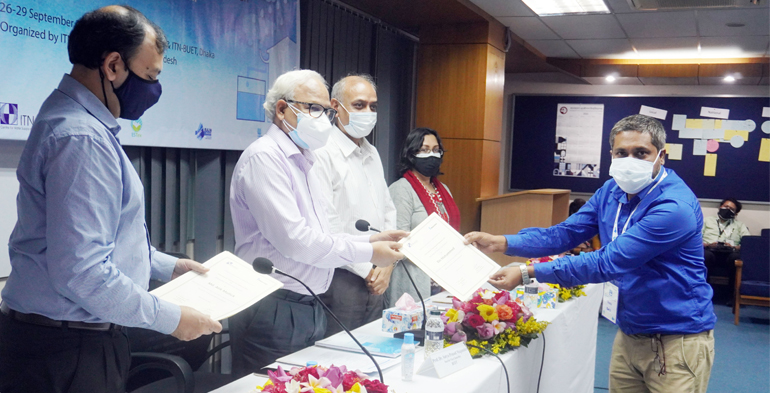
Din Mohammed :WaterAid Bangladesh in collaboration with International Training Network Centre, BUET (ITN-BUET) had jointly organized a four-day long International training on Rainwater Harvesting System and Exposure Visit. The program started on 26 September 2021 at Sarah Resort, Gazipur, continued on four days and ended by A certificate distribution and closing ceremony program hold at the conference hall of International Training Network Centre, BUET(ITN-BUET) on 29 September 2021 evening .
Professor Prof. Dr. Satya Prasad Majumder, Hon’ble Vice-Chancellor, BUET was present as the Chief Guest in the closing session and Prof. Dr. Abdul Jabbar Khan, Pro-Vice-Chancellor, BUET, Ms. Hasin Jahan, Country Director, WaterAid Bangladesh , Mr. Md. Ashraful Alam, Director General, HBRI were present as the Guest of Honors: The programme was chaired by Prof. Dr. Tanvir Ahmed, Director, ITN-BUET, Md. Azizur Rahman, Assistant Director (Research),ITN-BUET and Nowrin Mow, Programme Officer- Engineer, WaterAid Bangladesh coordinated the training program. Mohammad Imtiaz Sharif training specialist of ITN-BUET, Md. Tahmidul Islam Technical advisor-WASH, WaterAid Bangladesh Rakib Uddin Ahmed, Senior Information & Documentation Officer ITN-BUET, Shimul Ghosh of ITN-BUET were closely connected over the training period. Among the participants Atikqur Rahman Mollick ,Environment specialist,O.CREEDS spoke on the occasion .
Rainwater harvesting provides a cost-effective and practical solution to reduce water crisis in both rural and urban contexts. In urban areas, at a household level, rainwater can be used for flushing toilets, watering gardens, washing floors, and other non-potable purposes, thereby reducing dependency on existing water supply sources such as groundwater. At the same time, by managing rainwater, the pressure on urban drainage systems could be reduced, and urban water-logging could be avoided. Moreover, it can provide an alternate water source to industries and business needs, as well.
Engineers, architects, environmentalists, industrialists, urban planners, academicians, policymakers, and development practitioners were participated the training.